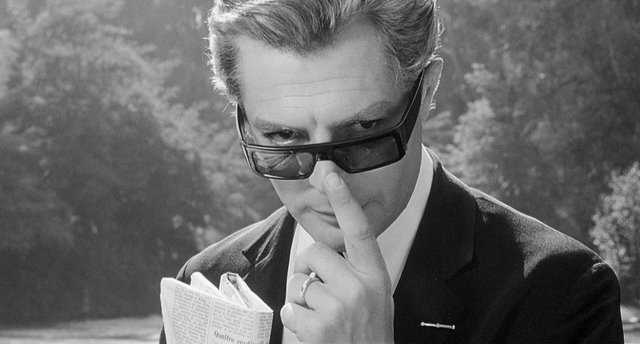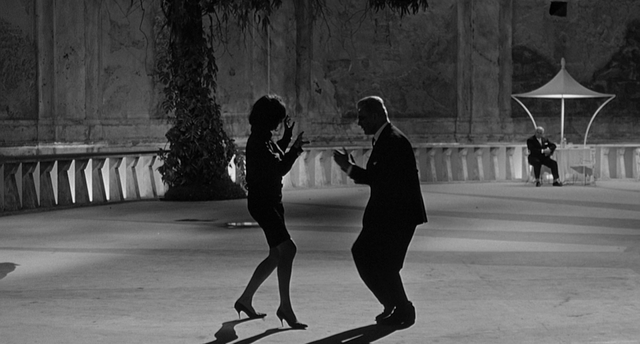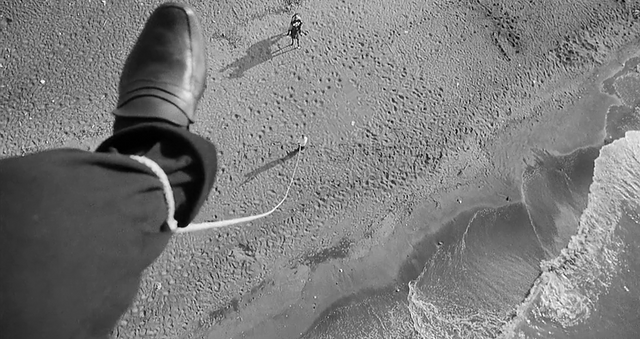/ Film Class #43 / 8 ½ / Federico Fellini

Italian filmmaker Federico Fellini has proven himself with a series of notable films since the fifties, dealing primarily with the theme of reality and human hopes (Luci di varietà, Il Vittelone), to go on a steep path of Italian neo-realism with psychological and moralistic thoughts (La strada, Il bidone, Le notti di Cabiria). The turning point of the genre and thematic framework, as well as the confirmation of the director's success, is made by La Dolce Vita in 1960 - a film in which he introduces a series of modern narrative strategies, leaving the neorealistic view of poor environments and small people, pointing this time to the trendy, urban class of Italian society .
La Dolce Vita brings great success, at the Cannes Film Award, and becomes a burden to the director for the expectation of his future work, and he ultimately falls into the creative crisis. But as great as he really was, Fellini takes his power and frustration and transfers them to the screen with the theme of the artistic crisis of fictional director Guido Anselmi, Fellini's alter ego.

Already in the movie La dolce vita Fellini touches on many elements of his own life, but 8 ½ (1963) contains a direct autobiographical note that has been highlighted already in the title of the film. Namely, "Eighth and a Half" refers to the current directorship of six full-length movies, two episodes in omnibus, and one of the collars considered by the half and, finally, the movie 8 ½.
This consecutive drama follows the famous director Anselm (Marcello Mastroianni), who spends time in termes to somehow heal the lack of inspiration that followed after his last, highly successful film. There are numerous Anselm's associates who are expecting a continuation of his career, so a very expensive film project is being prepared for which Guido has not elaborated any specific idea. The pressure of associates and journalists makes it difficult for him to battle with himself, and even all the forces of women around him can't help him. From his wife Luise (Anouk Aimée) and mistress Carla (Sandra Milo) to a series of actresses who want to work with him, Anselmi does not find a way out of a vicious cycle in which he can not do without women, and he doesn't know how and exactly what he wants from them.

And while everyone around him is looking for attention, directions and explanations, his inner world is full of reminiscences of the past, surreal dreams, and visions of possible personal successes (for example, the vision of a complex harem of all the women he loves) and of failures. The above elements make up episodes within the film that Anselmi constructs in the manner of movie clips, and his perception, essentially pervading the film discourse, as well as the underlying theme of trying to film a film within the film, makes one of the best metaphilms, i.e. films about films, which we could watch in the history of cinema.
What Fellini has done in this case is a masterful, magnificent screening of memories and dreams that, under the influence of Jung and psychoanalysis, are extremely suggestive and symbolic, but also visually rich and well-decorated, much better than the case with Anselm's hard-working everyday life. In this sense, we can distinguish Anselm's return to an early childhood when he swam with a large number of other children, with the care of mothers and grandmother bathing in a large barrel full of water, or when, during his education at a Catholic institute, he went to a grotesque prostitute with a group of friends with whom he had joyfully danced.
The interweaving of the parody-intellectualized discourse of film critic (and the caricature characteristics of all other members of the film industry) and preparations for the shooting of the SF blockbuster, in contrast to the immediate feelings and memories that are being made in Anselm's mind, show the complexity of the process of artist creation and all the accompanying circumstances hindering that path . In that gap of reality it becomes difficult to distinguish what the director is really experiencing, and what he thinks (and doesn't live through it, just imagines it). Fellini went deep with everything he touched in this film, but it was done very skilfully with a lot of attention to every frame. While criticizing the snobbish, political film world, on the other hand, it creates an apology for a film that in this case appears as an artistic expression in the full sense of the word.
The complex structure that opens up space for the director's own story, but also the personal upgrading of the viewer and his interpretation, on a constant border of beauty and grotesque, creates a challenging and very peculiar whole. Fellini's contemporaries recognized this, so he won the Oscar Award for Best Foreign Film and the First Prize at the Film Festival in Moscow. The popularity and influence that he left on the film industry is inseparable to this day as the source of inspiration to which anyone who loves film needs to come back from time to time.
Note: This was my translation from Croatian to English from Ziher hr article ''Retropetak:Od krize od remek dela (''8 ½ Federico Fellini'') by M.Ban
The opening scene is absolutely amazing
Beautiful nice video post shearing thank you pelese halp myvite
I love this kind of movies It gives you a sense of how people live in the old
good post @marinauzelac
didn't really get engaged with this movie ... honestly as much as i like world cinema there is not a lot of classic euro movies and new wave era films that appeal to me pre-1970